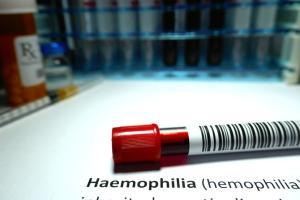Despite its alarming symptoms, the disease largely remains undetected and undiagnosed. This is because Haemophilia is still a rare disease and one that is usually inherited

Representational Pic
According to the WFH, India ranks second on the list of countries with the highest number of Haemophilia patients in the world, with as many as 17,000 recorded haemophiliacs. Haemophilia is a severe bleeding disorder which causes patients to be deficient or severely lacking in a specific kind of protein called ‘clotting factors’. In the absence of these proteins, the blood is unable to clot, leading to excessive and continuous bleeding.
ADVERTISEMENT
Despite its alarming symptoms, the disease largely remains undetected and undiagnosed. This is because it is still a rare disease and one that is usually inherited. Thus, most haemophiliacs are unaware that they could even be suffering from it, until they experience intense bleeding due to trauma or surgery, despite living with it since their childhood. Although there is no cure yet, persons with haemophilia can lead a near to normal life, if they have access to sufficient clotting factor concentrate and can administer it preventatively to curb it and reduce bleeding. This is the standard of haemophilia care in developed economies. In developing countries, prophylaxis and home care management of haemophilia are not standard, due to low awareness, limited capacity, and absence of treatment guidelines.
Haemophilia occurs because of a defect in one of the clotting factor genes in the X chromosome of a patient. While a person with this disease is usually born with it, it can also be passed down from a mother to her son or daughter. Owing to this, the disease has been found to be more common in males, who possess XY sex chromosomes, and hence, lack a second X chromosome which can make up for the defective gene. Females, on the other hand, possess XX sex chromosomes, because of which, it affects fewer of them as compared to men.
There are two major forms of Haemophilia, type A and type B – patients suffering from the former severely lack in clotting factor VIII, while those suffering from the latter lack in clotting factor IX. 70 per cent of patients who have contracted Type A Haemophilia suffer from the more severe form of the disease, making up around 80 percent of Haemophilia cases all over the world. While Type B Haemophilia is the milder form of the condition, also known as "Christmas disease”, both A and B can be mild, moderate, or severe, based on how much clotting factor is present in the patient’s blood. A presence of 5 to 40 percent of the normal clotting factor in one’s blood is classified as a mild condition, 1 to 5 percent is considered moderate, and anything below 1 per cent is considered extremely severe.
Occurring in one out of every 20,000 males born worldwide, Haemophilia can be fatal if left unattended. Diagnostic tests also need to be performed at extremely specialised coagulation laboratories, as those not equipped and experienced enough to perform them may fail to diagnose the disease, or diagnose it incorrectly. This may lead to several complications, including resistance to treatment and viral infections from human clotting factors, along with damage to joints, muscles, and other body parts.
Haemophilia patients not only require utmost care and effective treatment, but the medication (Factor VIII) is also extremely expensive, preventing countless patients from obtaining appropriate treatment. Thus, it is extremely important to improve awareness regarding Haemophilia, and ensure regular check-ups are conducted, especially if one has a family history of the disease.
Fortunately, gene therapy, very effective and highly discussed method for haemophilia across the globe, is already under trial with impressive results. Moreover, long activity factors are also now available, thus making the administration process, a seamless one. With several states in India providing factors at subsidised rates or even free, there is hope for developing a permanent cure for the disorder in the long haul.
Dr. Samir Shah, Haematologist, Saifee Hospital, Mumbai
Top News stories of the day
- Mumbai: Derailment at Kurla disrupts Central Railway train services
- Mumbai crime: Popular salon stylist groped me, says actress
- Mumbai: Behind PG medico's suicide, constant barbs in WhatsApp groups
- Blood banks that don't update stock status will lose licence
- Mumbai: 50-year-old critically injured in Jogeshwari gas explosion dies
- Narendra Modi visits mother Heeraben in Gandhinagar, seeks blessings
- Mumbai crime: FIR registered in Anurag Kashyap's tweet plaint
- Mumbai: Vikhroli Metro station to tower over EEH, JVLR
- Narendra Dabholkar murder: 'Defence lawyer's clerk arrested from Thane'
- Super volatile all this while
- Mumbai: Civic body to find out if parking under open spaces is possible
- Mumbai crime: Two fake cops trying to loot senior citizen arrested
- Mumbai: Western Railway's third AC local will roll out in December
- Daawat to dine
- A Himalayan feast
Catch up on all the latest Crime, National, International and Hatke news here. Also download the new mid-day Android and iOS apps to get latest updates
 Subscribe today by clicking the link and stay updated with the latest news!" Click here!
Subscribe today by clicking the link and stay updated with the latest news!" Click here!






